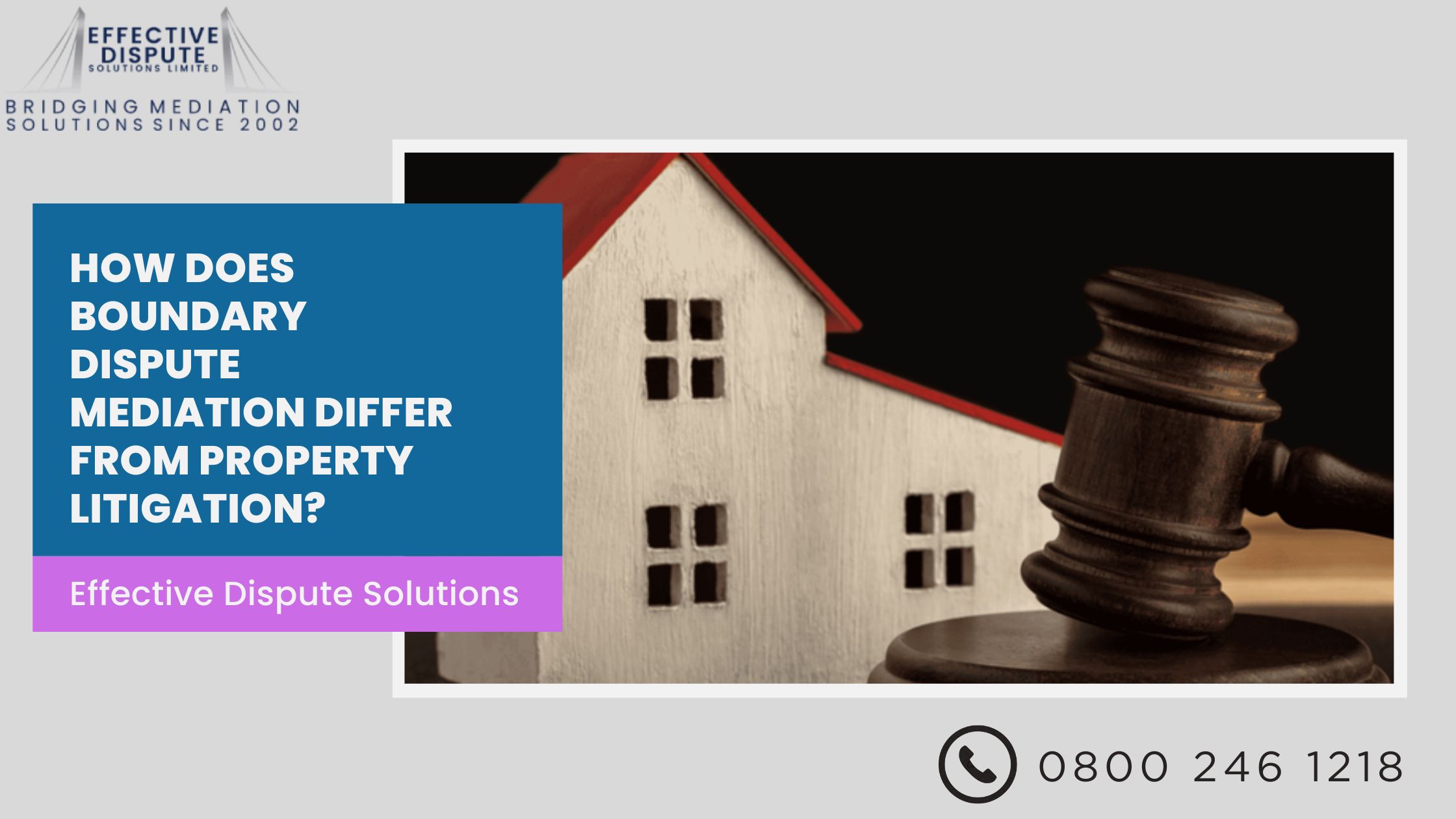Where does the line get drawn when two neighboring houses get into disagreement over their property boundaries? Property line disputes are more common than one would think. When disputes get heated, people wonder if the more conventional approach of going to court is the best way to resolve the issue, or if a more peaceful alternative like mediation is a better option. Knowing the differences between boundary dispute mediation and property litigation will enable you to pick a path that takes the least amount of time and delivers a speedy outcome.
What Is a Boundary Dispute?
Disputes are conflicts that two or more parties have over an issue. Boundary disputes are conflicts that two or more parties have over the dividing line of their property boundaries. Property boundaries can be marked by fences, hedges, walls, or even underground pipes.
While boundary disputes are more common among neighbours, they may also occur between landlords and tenants, government authorities, or even between a contractor and a property owner. Or commercial businesses who happen to have adjoining units.
In the UK, all of these disputes fall under legal property and land boundary conflicts. As expected, they can lead to a lot of frustration, a breakdown of relationships, and, if the conflicts are litigated, can become enormously expensive.
It’s pretty easy to see how most people worry about these things:
- How can I prove where my property line is?
- How much time will it take to solve the argument?
- What is the cost?
- Is it possible to solve the argument outside of the court?
Knowing the answer to these questions can help one make the best decision about solving their property line and boundary issues.
What is Property Litigation?
Property litigation is the act of taking a property dispute through the courts. This is a formal procedure that requires a solicitor or barrister and will take months or years to resolve. The court will consider the matter based upon documentary evidence, which includes title deeds, maps, and expert surveys. A decision is then legally enforced concerning the boundary.
If you ponder, “Property dispute case comes under which court?” In the UK, most boundary cases are dealt with in the County Court or the High Court, depending on the dispute’s value and complexity.
Litigation is quite often stressful and expensive because, for the most part, every party to the dispute is represented, court fees are paid, and time, which is significant, is spent on the matter. A case that has received judgment also affords little room for adjustment.
What Is Boundary Dispute Mediation ?
Boundary dispute mediation is a private and informal method of resolving disputes with the help of an independent person. The mediator assists both parties in arriving at a standard solution. Mediation is faster and less expensive than going to court. Unlike the court system, the mediator does not decide on who is right or wrong. Instead, they facilitate dialogue, promote collaboration, and suggest workable different options.
Here are several reasons why boundary disputes mediation service is beneficial:
- It helps maintain a friendly, cordial, civil relationship.
- Everything is kept private, meaning it is not made public in court files.
- It is faster than long-drawn court cases.
- It costs less in legal fees because solicitors are less involved.
- The parties have a say on the final decision.
- Once both parties sign an agreement, it is legally binding.
Mediators in the UK with organisations such as Effective Dispute Solutions have extensive experience with civil, commercial, and property disputes, and are adept at solving intricate boundary problems.
Key Differences Between Mediation and Litigation for Boundary Disputes
| Aspect | Boundary Dispute Mediation Service | Property Litigation |
| Process | Informal, private talks with mediator guidance | Formal court procedure with judge decision |
| Time | Typically faster, can be arranged within weeks and resolved in just one day | Often takes months or years |
| Cost | Lower cost due to less legal involvement | Higher costs from solicitor fees and court expenses |
| Control | Parties create their own agreement | Judge imposes decision |
| Relationship Impact | Encourages cooperation, maintains neighbourly ties | Can increase hostility and damage relationships |
| Confidentiality | Confidential; no public record | Court decisions become public |
| Legal Binding | Legally binding once signed | Legally binding court order |
| Flexibility | Highly flexible, tailored solutions possible | Limited to legal remedies available |
To conclude, boundary disputes mediation is a method of settling disputes in a far more cost and time-efficient manner, in comparison to boundary disputes litigation, which can prolong and complicate disputes.
At What Point Should You Choose Mediation or Litigation?
Mediation is often more effective when neighbours wish to preserve relations and resolve disputes harmoniously while agreeing on a solution soon. Boundary disputes mediation service works best with disputes like shared fences, shared trees, access rights, or indecipherable deeds.
However, if the other side is not willing to cooperate or if the issue involves intricate legal matters or large amounts of money, you may need to resort to litigation to protect your rights.
Guidelines to Help Mediation Succeed for Boundary Disputes
- Gather the pertinent materials, for example, deeds, surveys, and other correspondence.
- Come to mediation willing to cooperate and try to agree.
- Select a specialised property law mediation service for boundary disputes.
- Recognise that the goal of mediation is to achieve a functional solution, not ‘winning’ in the traditional sense.
- Be mindful that mediation is confidential, and after signing, it is legally binding.
How Mediation is Supporting Dispute Resolution in the UK
Mediation is one of the UK’s focus areas of alternative dispute resolution (ADR), which aims to lower the burden of the courts by providing cheaper and friendlier resolutions. It is backed by the Civil Mediation Council and is woven into the fabric of professional culture.
When giving legal advice, solicitors tend to suggest mediation first for property disputes, as it saves the client considerable time, finances, and stress.
Final Thoughts
Disputes over boundaries need not wreck relationships or exhaust resources. Boundary disputes mediation services helps to resolve boundary disputes in a less expensive and less stressful manner compared to litigation. Unlike the court battles where solicitors and barristers take over the case, mediation is a cooperative process that allows you to take control over the outcome.
If you have a boundary dispute problem, you may want to try a boundary dispute mediation service such as Effective Dispute Solutions. Their professional mediators can help you both find a solution that will save you time, money, and stress through a smooth and private process tailored to your needs.
This approach reflects the essence of mediation in the UK, where disputes are resolved in a friendly manner through private and legally binding agreements based on mutual trust and collaboration.


